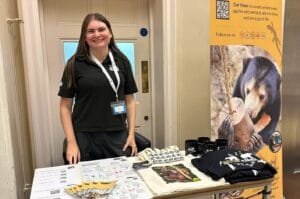Global animal welfare charity, Wild Welfare has proudly supported UK Animal Care Technicians (UKACT), an association working to improve animal welfare and husbandry practices within British educational institutions. What began as a simple Facebook group in 2019 to address a gap within the academic animal care sector has now grown into a professional organisation boasting over 1,000 members.
 Over six years on, UKACT continues to provide a platform for some 120 animal colleges and 130 farm schools across the country to connect and homogenise animal welfare and husbandry practices. Unlike facilities such as UK zoos and aquariums, which have dedicated licensing and professional bodies to uphold animal care and welfare standards, educational institutions, like colleges with animal units, lack a similar universal system. However, UKACT has already collectively begun the process of producing best practice guidelines in the absence of unified standards and a licensing system.
Over six years on, UKACT continues to provide a platform for some 120 animal colleges and 130 farm schools across the country to connect and homogenise animal welfare and husbandry practices. Unlike facilities such as UK zoos and aquariums, which have dedicated licensing and professional bodies to uphold animal care and welfare standards, educational institutions, like colleges with animal units, lack a similar universal system. However, UKACT has already collectively begun the process of producing best practice guidelines in the absence of unified standards and a licensing system.
UKACT now hosts a thriving annual conference for their members to network and share ideas on driving forward animal welfare improvements across the community. This year, the two-day event was held at Staffordshire’s Rodbaston College, welcoming over 80 animal care technicians, zookeepers, lecturers and industry experts. Wild Welfare’s Animal Welfare Field Manager, Sarah Bonser-Blake, was invited along to present a 30-minute talk entitled ‘Creative & Strategic Enrichment in relation to Animal Welfare’. The presentation engaged attendees in a broad range of topics including animal welfare models, behavioural goals for enrichment, enrichment categories and monitoring, along with choice, comfort and control. It also allowed the charity to share their free online resources with a new community who could make great use of them to support animals within college settings.
The conference provided attendees with even more continued personal development opportunities, including welfare assessment activities and browse identifying sessions, and even an enclosure furniture building workshop specifically for goats. The many different areas explored at the conference truly demonstrated the varied array of skills required by professionals in the animal care education sector, whether that be working directly with threatened reptiles or exotic pets, to the teaching of students about key practices and principles.

Wild Welfare’s mascot, Amu, also attended the event with Sarah.
Sarah expressed how the conference was great fun, “I met so many new people who were palpably excited by what we are doing, many of whom were keen to get involved themselves! It’s always really heartening when we receive so much direct enthusiasm and support.” Sarah went on to explain how she learned a lot about the different challenges animal care technicians face in terms of meeting animal’s needs alongside the student and curriculum needs. “It’s a very different set of challenges from zoos or rescue centres, for example, having to consider the needs of the students and their learning curriculum as well as animal welfare.” Sarah observed.
Animal care technicians within educational institutions face many unique and often complex challenges that require careful consideration for both animal welfare and curriculum requirements. This can mean carefully managing how often animals are handled for student practice, or designing enclosures that are both naturalistically suitable for the species and safe for students. Technicians are increasingly using structured welfare frameworks to guide their decisionmaking and ensure the needs of the animals are prioritised. This can take the shape of providing refuge areas for animals, allowing for greater choice and control or even offering alternative methods of teaching including videos and interactive resources, removing the need for unnecessary handling of live animals when possible.
Wild Welfare’s dedicated stall also offered attendees the chance to learn more about the organisation’s important work and ask questions directly to Sarah. “We were overwhelmed by the level of interest and support from attendees, with so many keen to learn more about our work” explained Sarah. Many UKACT members showed their support by purchasing Wild Welfare merchandise, with every sale directly helping to fund positive global welfare changes for captive wild animals.
Wild Welfare were greatly appreciative of the UKACT team for inviting them to the event and for being so welcoming. “I am very thankful for the invitation to speak and for the enthusiastic support shown by delegates throughout the wonderful event”, Sarah remarked. It is hoped that this new relationship with UKACT will continue to support the community, inspiring welfare-focused policies, practices and approaches within animal care education across the UK and beyond.
ENDS
Wild Welfare is devoted to improving the welfare of captive animals across the world. You can support our efforts by sharing this article, signing up to our newsletter, following our social media accounts (Facebook and Instagram), or by making an online donation. Every small contribution can help us to develop our vital accessible animal resources. Thank you.
Notes to Editors
For more information or interview requests please contact Wild Welfare on communications@wildwelfare.org
Wild Welfare is a global organisation committed to improving animal welfare for captive wild animals. By uniting the world’s leading zoos, zoo associations and animal welfare organisations, we build trusting partnerships that help provide long-term solutions to critical wild animal welfare issues.
Our vision is to end the suffering of captive wild animals around the world and ensure full and sustainable protection is given to all animals in human care. Find out more at wildwelfare.org. Registered charity in England (no.1165941).





![Cimetidine Coupon for Pets [2026] Cimetidine Coupon for Pets [2026]](https://dogtrainingtips.bid/wp-content/uploads/2026/01/Cimetidine-Coupon-for-Pets-2026-120x86.jpg)



Discussion about this post